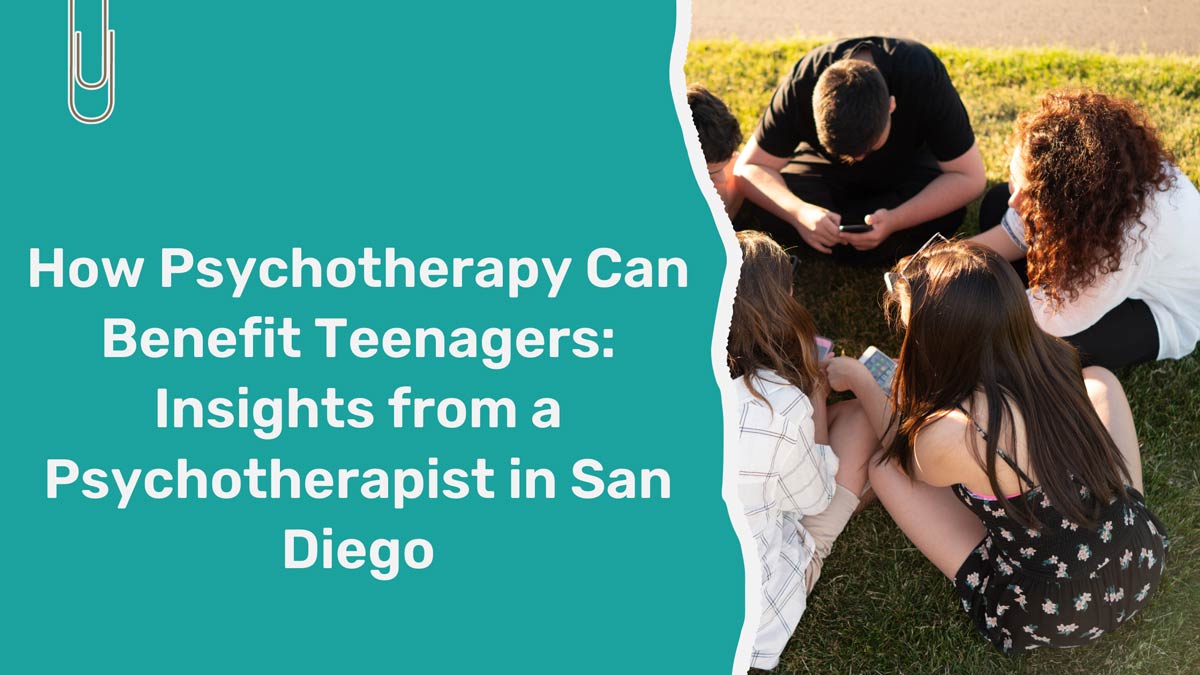How Psychotherapy Can Benefit Teenagers: Insights from a Psychotherapist in San Diego

Teens often experience intense emotions and mood swings. Psychotherapy helps teens develop skills to manage and regulate their emotions more effectively. Techniques learned in therapy, such as mindfulness and cognitive restructuring, can empower teens to handle stress and emotional challenges in healthier ways.
2. Enhanced Self-Awareness
Therapy provides teens with the opportunity to explore their thoughts, feelings, and behaviors in depth. Through this process, they gain a better understanding of themselves and their reactions. Increased self-awareness can lead to greater self-acceptance and improved self-esteem.
3. Effective Coping Strategies
Life as a teenager can be filled with pressures from school, relationships, and social expectations, especially in San Diego with our competitive environment for teens! Psychotherapy equips teens with practical coping strategies to handle these stressors. Skills such as problem-solving, relaxation techniques, and effective communication can help them navigate everyday challenges more confidently.
4. Improved Relationships
Many teens struggle with interpersonal relationships, whether with family, friends, or peers. Psychotherapy can help teens improve their communication skills, understand different perspectives, and resolve conflicts more effectively. By addressing underlying issues, therapy can foster healthier and more fulfilling relationships
5. Support for Mental Health Issues
Teenagers may face various mental health challenges, including anxiety, depression, and behavioral issues. A psychologist in San Diego can provide specialized support for these conditions. Therapies like Cognitive Behavioral Therapy (CBT) or Acceptance and Commitment Therapy (ACT) have been shown to be effective in treating anxiety and depression by helping teens change negative thought patterns and behaviors.
6. Building Resilience
Psychotherapy helps teens build resilience by teaching them how to cope with adversity and setbacks. Through therapy, teens learn to view challenges as opportunities for growth and develop a positive outlook on their ability to overcome obstacles.
7. Safe Space for Expression
Adolescents often struggle to express their feelings and thoughts openly. Therapy provides a confidential and non-judgmental space where teens can talk about their concerns, fears, and dreams. This safe environment can be crucial for those who feel unable to open up with family or friends.
- Initial Assessment: The therapist will start with an assessment to understand the teen’s (and parent’s) concerns, history, and goals for therapy.
- Goal Setting: Together, the therapist and teen will set specific, achievable goals for therapy.
- Therapeutic Techniques: Depending on the therapist’s approach, various techniques may be used, including CBT, mindfulness, or play therapy. As a teen therapist myself, I have found teens often like opening up while playing a card game or engaging in an art activity.
- Ongoing Support: Regular sessions provide continued support and the opportunity to review progress and make adjustments as needed.
If you’re considering psychotherapy for your teenager or want to learn more about how it can help, don’t hesitate to reach out to our practice. We’re here to provide guidance and support on your family’s journey toward mental wellness.
Reach out to start
your healing journey

